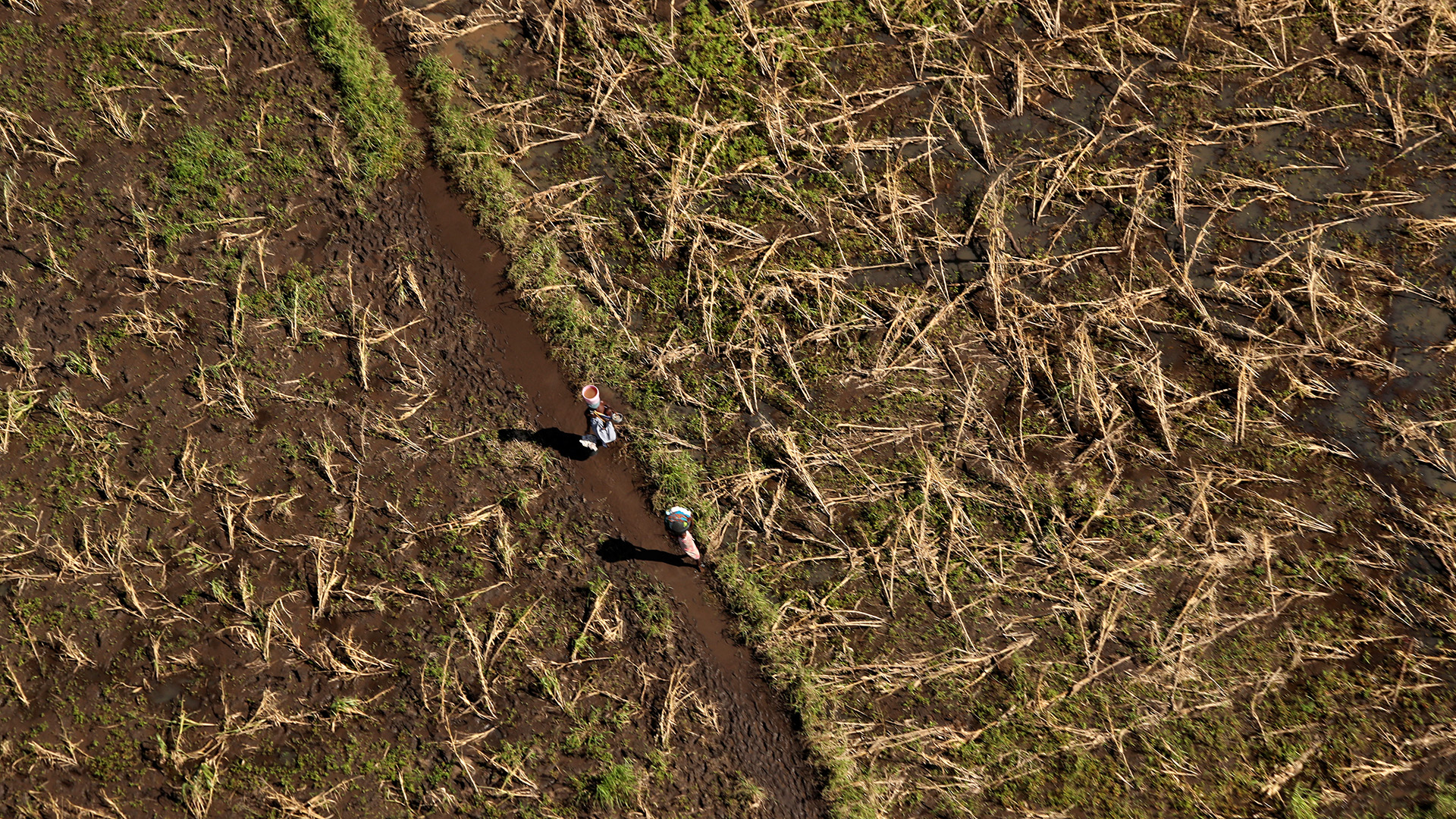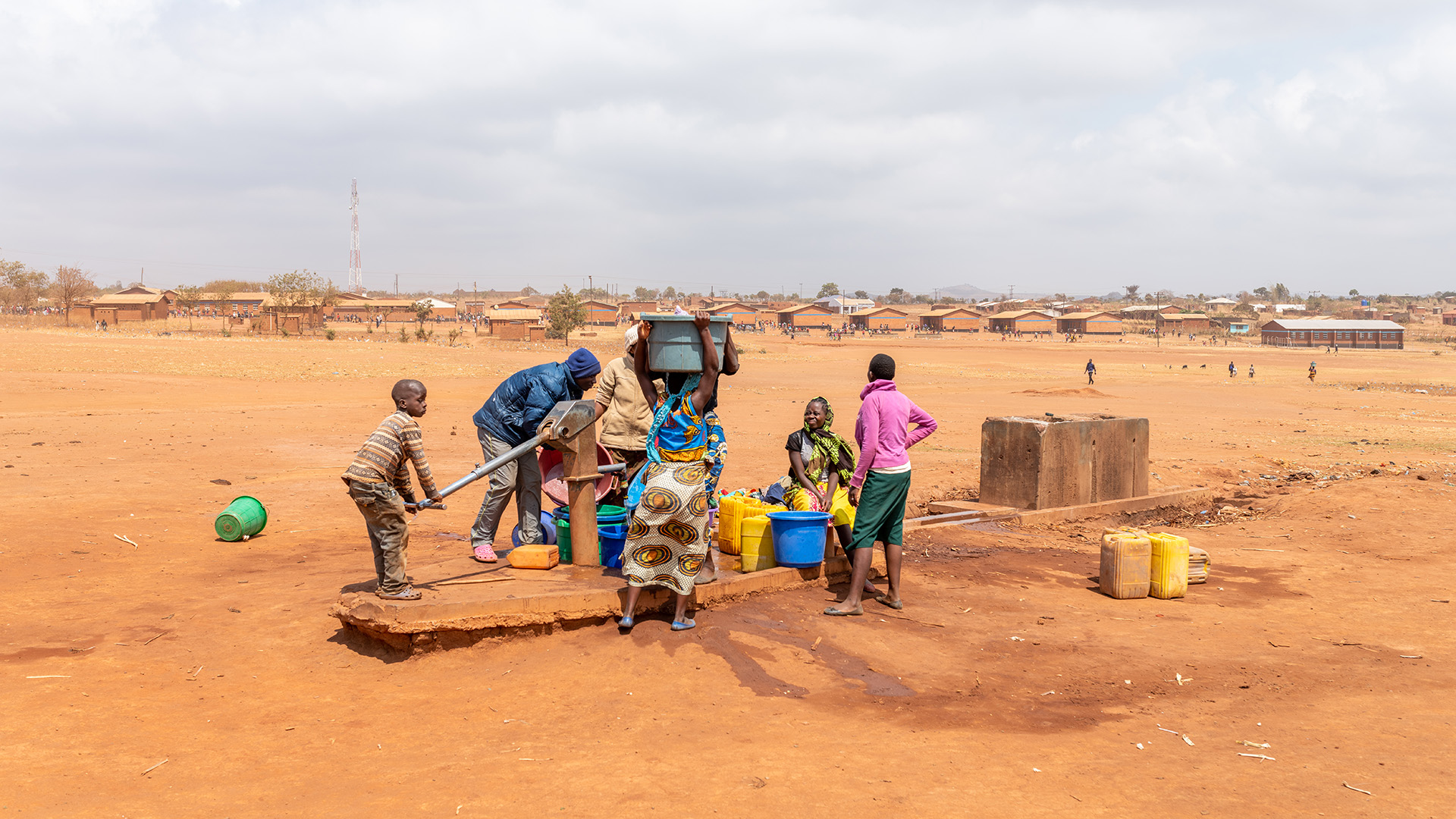Marriage of survival: Will climate change mean more child brides?
Evidence suggests that environmental disasters could lead to earlier marriages in the communities gravely affected.

After Cyclone Idai battered southern Malawi last year, the hotline Weston Msowoya manages was flooded with calls. They were reporting cases of young girls being married off in the tented camps hastily established by the United Nations Refugee Agency and other aid groups to house some 94,000 people displaced by one of the deadliest storms to ever hit the southern hemisphere.
By the time it had subsided, more than 1,000 people in three countries were dead. Some 1.85 million people needed support in Mozambique alone – from housing to food to healthcare, particularly in the port city of Beira, a staggering 90 percent of which had been destroyed. In Malawi, Msowoya was watching another tragedy unfold: he recorded 74 child marriages just in the camps he was able to reach (others were blocked because swathes of the country were under water).
Keep reading
list of 4 itemsThousands evacuate as wildfire grows ‘dramatically’ in western Canada
Photos: Flash floods in Afghanistan devastate lives and livelihoods
Floods kill 50 people in northern Afghanistan’s Baghlan province
It was double the number of underage brides he normally saw as executive director of the Centre for Community and Youth Development, a nonprofit in the capital, Lilongwe that monitors child marriage through community outreach activities that include a hotline advertised through word-of-mouth, pamphlets, and door-to-door visits. While marriage before age 18 was outlawed in Malawi last year, nearly 50 percent of girls in the country wed earlier.
“It’s heartbreaking. Imagine the trauma they’re going through,” said Msowoya, thinking of his 11-year-old daughter, the same age as some of the girls married after the cyclone. “They take men as their only hope of survival.”
Thanks to climate change, extreme weather events like Cyclone Idai will likely ramp up dramatically in the coming years, including more devastating flooding from rising sea levels and storms with unprecedented severity. Droughts have already increased in frequency and intensity, particularly in Africa. A growing body of evidence is showing that what Msowoya observed is not an anomaly: the pernicious effects of climate change are increasing child marriage.
“When there is a crisis, when people really feel that they have a threat to their survival, that’s when there is a push to get your daughter married off because parents feel that they’re not able to support them,” explained Nitya Rao, a professor of gender and development at the University of East Anglia. “It’s best for me to get my daughters married off sooner because I can’t take care of them and they’re not safe,” she added, explaining how parents reason through their difficult decision.
One in five
As the effects of climate change worsen – as is expected – parents in the global south will be forced into this position more often. Many researchers believe that Africa will be the continent hit hardest by the effects of climate change. Poor countries that have contributed the least to the greenhouse gases causing climate change are already taking some of the hardest economic hits from climate-related disasters.
Every year, 12 million underage girls get married; one in five girls get married before adulthood, according to Girls Not Brides, an international nonprofit working to end child marriage. The practice is most common in sub-Saharan Africa where almost four in 10 girls are married before age 18, followed closely by South Asia – two continents where many are already struggling to survive the effects of climate change.
It is a practice, however, that cuts across cultures and religions and occurs everywhere in the world – including the United States. It is associated with a host of negative effects, from cutting girl’s education short, to increasing their risk of domestic violence, to their likelihood of experiencing complications in childbirth and the chances that their children will die in infancy.
The practice is decreasing globally, but like many women’s rights gains – such as reduced maternal mortality and increased primary school attendance rates – there is growing evidence around the world that shows climate change is threatening how long that will hold true.

“This is a place affected by river erosion,” the parents of a Bangladeshi girl named Azima told her, explaining why she had to marry at 13, according to Human Rights Watch. “If the river takes our house it will be hard for you to get married so it’s better if you get married now,” they said.
In Mozambique, Majuma Julio told journalists her uncle’s crop failures forced him to marry her off at 15. “It was because of the sun. There was too much sun and the rain was not falling enough. His production started to decrease three years before the marriage,” she said. “It used to rain for two months, but after a while, it started coming less and less.”
One less mouth to feed
Marrying off an underage daughter during a climate-related disaster can mean there is one less mouth to feed or parents may believe that it will protect girls from the increased risk of sexual exploitation, said Rachel Yates, the head of learning at Girls Not Brides. Studies show that droughts increase the likelihood of women and girls being forced into trading sex for food or money and that when displaced they are at a higher risk of rape. Dowry or bride price – a payment of cash or goods often made to a bride’s family by the groom’s family – can also provide a desperately needed infusion of cash during lean times.
Early marriage is not the only damaging effect climate change has on poor women and girls. Last month, a study by the International Union for the Conservation of Nature found that environmental degradation can lead to an increase in sexual assault, domestic violence, and forced prostitution. Rao’s research analysed the impact of climate change across Asia and Africa and found that it is decreasing women’s agency, diminishing their typically already reduced control over finances and work. In fact, women and children are 14 times more likely than men to die in natural disasters, including because they are more likely to be undernourished, they are often caretakers weighed down with infants, and because they are less likely to know how to swim.
Redistribute income so that poor parents don't have to feel like they have to choose between starving everyone or starving one person, which will usually be the girl.
One thing that this growing research is helping with is a reframing of the global understanding of child marriage. Instead of a barbarous tradition practised by regressive cultures, it is a Sophie’s Choice forced upon poor parents who have run out of options – and whose choices will continue to diminish with climate change.
“Parents all love their children equally but when they’re resource-constrained, they are trying to make the best possible choices to improve wellbeing within their households,” said Belinda Archibong, assistant professor of economics at Barnard who is studying the phenomenon. “If I’m going to experience this huge shock from climate change and I’m trying to figure out how to invest my scarce resources, I am going to invest in my son.”
The reality is that men make more money – parents know that investing in them could bring life-saving returns.
This hints at another misstep, which is understanding women and girls in oversimplified terms.
Not just victims of circumstance
“We almost see them as if they have no choice, they’re just victims of circumstance,” said Rao. “Women exercise some independence and strategic thinking in what might be best in terms of their outcome, even within their constrained choices. We have to look at women as conscious people.”
This misconception will inhibit efforts to solve the problem, said Rao – as will a lack of research. Currently, a lot of what we know is qualitative, explained Yates, based on the observations of activists like Msowoya.
Archibong is helping bolster the evidence base by working backwards. She studied Niger’s 1986 meningitis epidemic, a disease that spikes in dry seasons, and found that the outbreak pushed families to marry their daughters off early because they needed the bride price to cope with medical expenses, which also cut girls’ education short. It is evidence, she said, that suggests that as climate change exacerbates disease outbreaks and extreme weather, gender gaps could increase.
Despite these bleak predictions, Archibong remains optimistic about interventions – especially if they are done now while the worst effects of warming are still nascent.
“Redistribute income so that poor parents don’t have to feel like they have to choose between starving everyone or starving one person, which will usually be the girl,” said Archibong, who advocates for gender-conscious taxation systems that incentivise companies to pay men and women equally, or remove taxes that make sanitary products more expensive.

Another method that has shown some success is cash transfers – regular payments to poor families to reduce poverty and create a safety net in times of crises. In Malawi, one cash transfer programme found that girls were less likely to drop out of school and, if they had already dropped out, their rates of early pregnancy and marriage decreased.
Yates says it is important to pair economic support with social intervention and points to a very successful Population Council programme in Ethiopia that paired community discussions about the effects of child marriage, school supplies for girls, and a goat for families who kept their daughters unmarried for the duration of the programme.
“There’s no one silver bullet, it’s a combination of interventions that seem to be making the difference,” said Yates.
Help for poorer countries
Ultimately, however, piecemeal interventions will be insufficient alone.
The Intergovernmental Panel on Climate Change warns that there are just more than 10 years left to stop warming over 1.5 degrees Celsius (2.7 degrees Fahrenheit), after which the kind of droughts and flooding that lead to child marriage will increase in frequency and severity. To do this will require cutting carbon emissions by almost half by 2030 and entirely by 2050.
It will also require that the wealthy countries responsible for climate change contribute to mechanisms like the Green Climate Fund to help poorer countries cope with the effects – including preparation for natural disasters and increasing child marriage.
For now, Msowoya says that the seasonal flooding has started in Malawi, including January flash floods that affected upwards of 600 houses. The worst damage even reached the capital city of Lilongwe, a phenomenon Msowoya said was once unheard of.
As families scramble for shelter, he said calls to his hotline reporting child marriages are again increasing. In addition to fielding calls, Msowoya is also helping to pay school fees if families cannot keep up, educating communities about the dangers of child marriage, and bringing in law enforcement when all else fails.
“We just need more time, if we had more time we could arrange things. We cannot manage this situation alone,” he said. “If we do, we should expect the worst.”